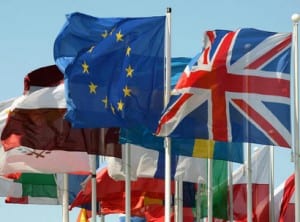 UKIP Leader Nigel Farage’s comments on the back of his party’s successful EU election campaign, in that it was “the biggest change in politics for 100 years”, may have sounded at first hearing as a slight overstatement, however on closer examination, Farage’s comments are not far off the mark.
UKIP Leader Nigel Farage’s comments on the back of his party’s successful EU election campaign, in that it was “the biggest change in politics for 100 years”, may have sounded at first hearing as a slight overstatement, however on closer examination, Farage’s comments are not far off the mark.
UKIP has undeniably disrupted the UK political landscape with their victory in the EU Election. It is the first time since 1906 that Labour or the Conservatives have not received the most votes in any election held in the UK. Coupled with their strong showing in the local elections, UKIP now seemingly has the momentum to make a further dent come the General Election next year and perhaps even secure their first parliamentary seat at Westminster.
Looking ahead, their success means that any referendum on EU membership in 2017 is now even more likely. This is of course already confirmed should the Conservatives secure a majority after the next election, but in the slightly more plausible scenario that Ed Miliband is the leader of a Labour Government, the pressure on him to offer the UK a vote on Europe will intensify. A commitment to an EU referendum will increasingly become the elephant in the corner of the room for Miliband and a possible deal breaker with voters ahead of next May. No matter who occupies Downing Street there will be a growing expectancy from the electorate that they are entitled to a say on the UK’s future relationship with the EU.
On the assumption that the three leading parties will be campaigning to remain part of the EU, (apart from the powerful Eurosceptic contingent on the right of the Conservatives with questions remaining on whether they could even form a breakaway splinter group), the task at hand for them to secure this will be a significant political challenge. With this in mind and reflecting over the recent elections, here are three points of note in terms of messaging that each leading party needs to bear in mind as they plan their long-term strategies in the run-up to any EU referendum on UK membership:
1. The importance of a unified campaign: The three leading parties will have to be seen to work together and campaign on a cohesive front. Given that there are not only existing differences between each party on the EU, but also major differences within the Conservatives, this will be challenging to execute. However not doing so will only play into the hands of UKIP who will unquestionably be able to present a compelling and unified position on the UK’s relationship with the EU.
2. The danger of being too negative: Messaging needs to imply the positives of staying part of the EU rather than outlining how dangerous it would be economically or politically if the UK were to leave. Such negativity could be used effectively by UKIP and brandished as scaremongering by the established parties of Westminster.
3. Don’t be seen to patronize voters: Similarly, messaging must not give the perception to voters of overlooking the emotive issues that matter to them most with regards to the EU, such as immigration. Whatever the myths and realities around particular issues, voters are put off when there is the absence of a credible narrative. If David Cameron secures a majority after 2015, he will have his work cut out to not just negotiate successfully on the key issues he has identified, such as border control and justice reforms, but more importantly convey effectively to voters how his achieved concessions will actually realise tangible benefits.
The leading parties are no doubt already drawing lessons on these three points from the Better Together campaign for Scotland to stay part of the UK ahead of any future EU referendum. The campaign being led by Labour’s former Chancellor, Alistair Darling, has been criticised more than once for its lack of direction in part due to a Conservative led government that is unpopular in Scotland trying to work alongside a Labour led campaign. The campaign has also been accused on occasions of being too negative for focussing too heavily on issues such as currency and debt rather than making the positive case for the union, with polling in favour of independence increasing in the early months of 2014.
A referendum on the UK’s membership of the EU is not yet guaranteed but the recent elections have pushed the UK ever closer towards one and provided a reminder of how complex campaigning in such a scenario will be. With just a year to go until the 2015 General Election, expect the guarantee of a referendum to play a central role in electioneering.
If you are interested to learn more about the potential impact of a future EU referendum or the existing Scottish Independence referendum on your business then contact the Ketchum public affairs team at [email protected].



